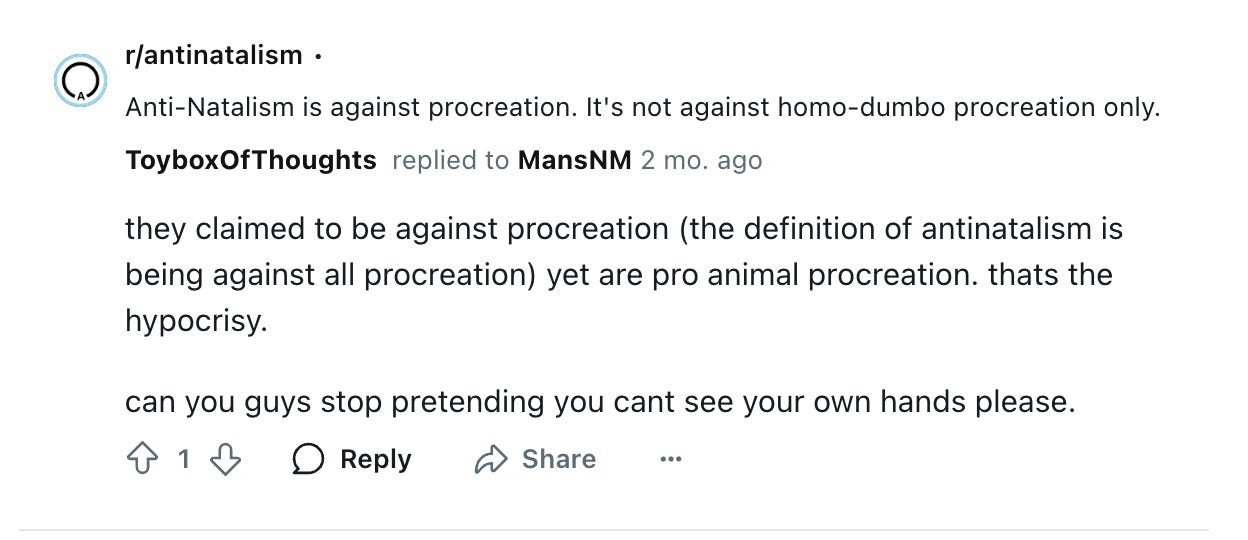An Efilist Just Bombed a Fertility Clinic. Was This Bound to Happen?

On Saturday morning, a parked SUV exploded outside the American Reproductive Centers fertility clinic, killing its driver and wounding at least four bystanders. Federal agents branded the blast an act of terrorism aimed at in-vitro fertilization. Shortly after, a bare-bones website—promortalism.com—surfaced, where the bomber, 25-year-old Guy Edward Bartkus, condemned “the disease of life,” and urged visitors to mirror and share “the recorded stream of my suicide & bombing” before censors intervened.
Bartkus’s rhetoric will be familiar to not only anyone who’s followed my reporting on efilism and promortalism, but anyone who has watched the strange after-life of utilitarianism (and early heterodox YouTube debate culture) on the Internet unfold. What you see in efilism is something you see across the web—a distinct style of moral bookkeeping.
default.blog is a reader-supported publication. To receive new posts and support my work, consider becoming a free or paid subscriber.
Effective Altruists have shrimp welfare. Silicon Valley’s Rationalists and other AI doomers extend the same habit to AI: if an unfriendly super-intelligence might one day turn the universe into paperclips, as Nick Bostrom’s 2003 thought experiment warned, then every present choice must be tallied against that cosmic risk. It’s unusual, occasionally antisocial, and can take us to some very dark places.
A Too Short History of Where Efilism Came From
(Because I’m Falling Asleep But Understand the Urgency of Publishing This Now)
In 2006 the South African philosopher David Benatar published Better Never to Have Been, arguing that existence itself is harm, because, according to him, the absence of pain is always good while the absence of pleasure matters only to someone forced to miss it. His book supplied the term antinatalism and the asymmetrical equation that sustains it:
any new birth inevitably adds suffering to the ledger.
Benatar’s argument drifted onto early YouTube—in a swamp of heterodox debating, particularly centered around New Atheism—where a user called DerivedEnergy posted a two-part “Defense of Antinatalism,” inviting other YouTubers to debate him, back when people made reply videos.
More radical voices soon arrived.
To make a long story short—too short, in fact, there’s a documentary worth of story in this—Gary Mosher, an irascible vlogger best known as Inmendham, ended up coining efilism—“life” spelled backwards—during this period to insist that every sentient organism is a factory for pain and ought to be snuffed out.
A rebuttal video, In the Name of Efilism, shows where the logic—or rather, illogic—of efilism leads: if speed is the paramount good, lining people up at a trench can outrank painstaking hospice care. Mosher himself acknowledges he would finish the job “as crude as I have to… I really don’t care about aesthetic crapola,” even musing that a handful of continental-shelf nuclear detonations might suffice.
Efilism recasts ongoing life as an emergency whose only adequate remedy is species-wide euthanasia—an ethic that, in Palm Springs, moved a seed from YouTube debate culture to a car bomb on an ordinary Saturday morning.
Readers of my work will know that Mosher’s tirades fascinated the Sandy Hook gunman Adam Lanza whose own YouTube videos riffed on efilism. He would eventually come up with his own, related, ideology called “eulavism,” which instead of being just against life, was against values.
Bartkus cites Lanza as an inspiration.
The slope steepened again with promortalism: if life is nothing but harm, why endure it? Bartkus claimed he was an efilist and promortalist. In his view, the Palm Springs blast was therefore not an outburst but, in the bomber’s arithmetic, it was another tally in a game of suffering avoided.
Reading this may call to mind another, similar group: the militantly anti-suffering Zizians. (Compare this antinatalist open letter warning antinatalists about efilism to the one circulated among Rationalists about Zizians.)
Like Bartkus, the Zizians justify violence through this same moral bookkeeping, not hatred or even nihilism. The same intellectual route—Benthamite utility, rationalism, cost-benefit—ends for them in ideas about pre-emptive self-defense against an unjust world.
Of course, there’s always a certain lack of self-awareness in these things.
Bartkus’s suicide landing page reads:
I've known for a few years now I wasn't going to allow myself to make it past my 20s. Recently my best friend Sophie killed herself (she got the guy she was living with to shoot her while she was sleeping, her preferred method), and I don't think I really knew how much it was going to affect me. I've never related to someone so much, and can't imagine I ever would again.
We were both antisex (don't mistake for asexual, I'm talking like r/antisex) misandrists, VegAntinatalist, negative utilitarians. Both also had borderline personality "disorder".
Anyways, we got along quite well and it was very nice, especially when you feel like you are in an apocalypse and nobody else seems to get anything. IIRC we had agreed that if one of us died, the other would probably soon follow. It's just too much of a loss when there's nobody else you really relate to significantly. Since she's dead, I'll link her reddit and tiktok where she made a few videos. She also had a tumblr account that she was very active on. She used to have more videos on her YouTube account but I guess she hid them before.
It’s too early to say definitively, though writing this I realize I really should be doing a background check on this guy, but his turn toward violence seems not to have been because of efilism but because of grief. The suicide of his closest friend cracked something open, and the ideology drifted in afterward, less a cause than a vocabulary for feelings he already had. 
That raises the usual question of “radicalization,” but the answer here is complicated. Plenty of people wander through fringe ideologies almost as "emotional third spaces” or as hobbyist forums. Most of these people never hurt anyone and never will. What distinguishes the handful who do isn’t the zeal of a jihadist—it isn’t even, strictly speaking, belief. It seems to be either something deeply emotional—and for that matter, interpersonal—or a stark nihilism.
In other words, Bartkus didn’t attack the clinic because he genuinely wanted to minimize suffering; he did it because, after his friend’s suicide, he no longer saw any reason to keep living himself. The very fact that another person’s absence could break him so completely exposes the contradiction in his stated belief system.
It shows, however bleakly, that life—and connection—still mattered to him.

Further Reading/Listening:
Update — 5/18/2025 — 8:15 AM CT:
Gary Mosher’s Response to the IVF Clinic Bombing
In Mosher’s response video to the IVF bombing, he condemns Bartkus’s actions, much like he condemned Lanza when people began drawing parallels there. It’s complicated. I’m not sure he should be held accountable for everything he’s ever said on stream. He often rambles and, frankly, talks out of his ass.
Take the stream below (or this supercut), for example, with Amanda Sukenick, who is both an efilist and antinatalist—arguably the second most well-known figure in each movement. Mosher is flippant. He says he doesn’t care. If someone causes harm to a Mengele-like figure because of the amount of suffering that person has caused themselves. He argues why should he feel sympathy if they’re killed? That’s not exactly a call to violence. But efilism is, in many ways, an explosion of Mosher’s inner world—lacking consistent structure or principle.
On one hand, maybe it doesn’t need to be. On the other, how much responsibility do we bear for our followers when we have large platforms that promote, to put it charitably, out-of-the-box thinking?
Watch on YouTube here if the embedded video doesn’t show up for you.
It’s striking how clearly he’s talking to an imagined audience in this mp3. “I know you guys will get triggered…”, complaints about censorship/free speech, YouTube de-platforming…
The audio sounds like a combination of Adam Lanza and Gary Mosher, he pays homage to both in his language and tone outside of explicit references (e.g. unintelligent design; graceful exit; references to deprivation)
Crazy thought, but the logic of these ideologies seems similar to extreme expressions of cancel culture. “If you’re causing harm, you need to die.”
In a YouTube video titled Don’t Go Quietly, posted on an account that appears to belong to Bartkus called InvoluntaryInception, he discusses the necessity of public suicide (https://archive.ph/gDB89). Again, he seems to draw inspiration from Adam Lanza in both form and content. He also appears to be very concerned with free speech in his YouTube videos.
I know antinatalist philosophies have always existed, talking about this specific genealogy
Antinatalists often do not to like or endorse efilists. There is A LOT of tension between the two communities. Childfree, antinatalism, and efilism have overlap, but there are also many accusations about infiltration and entryism.
With antinatalism and efilism specifically, members of the antinatalist community have increasingly expressed concern over Amanda Sukenick of ANI’s (Antinatalism International, the activist arm of efilism) ongoing efforts to rebrand antinatalism through the lens of Efilism. Sukenick has alienated many people in the community—but crucially not everyone—by continuing to promote Mosher and refusing to clearly distance herself from the violent rhetoric associated with efilism. Her framing of Efilism as a “superior” philosophical evolution has caused significant discomfort among the community, particularly given her stated goal of “efilizing” antinatalism from within. Many feel that her support for Mosher—whom she openly idolizes—undermines the compassionate and nonviolent ethical principles that supposedly define antinatalism.
Mosher has several YouTube channels, and a website DoNotGod.com:
In Bartkus’s words: it’s not sadism — it’s not pro-dying, it’s pro-nonexisting. His account seems consistent with other promortalists.
Unsurprisingly, suicides are common in this community. The official /r/efilism Discord server — which, for some reason, this last month was cleared and rebranded — reads: “Do not discuss suicide methods unless you are trained, experienced and educated healthcare worker who is able to provide painless, controlled euthanasia for such individual.”
Five years ago, a rumor circulated that an efilist killed his girlfriend, which Sukenick and Mosher responded to. This came to light after Mosher appeared on Exploring Antinatalism. According to sources close to the community, it was circulating around the roguephilosophy Discord server.
https://default.blog/p/72-the-coming-wave-of-sex-negativity/comments
There’s, I think, a completely separate but equally important article to be written about the sex negativity of Zoomers. It comes in many packages. Fetishistic internet phenomena like play-acting conservatism (“trads”) and mukbangs and hauls; the growing popularity of radical feminism and misandry among young women, as evidenced by his friend; femcels/incels, the manosphere… I’m particularly interested in the explosion of a particularly misanthropic brand of radical feminism. I think it’s wrong to call these women femcels, though they use the term. Femcels are women who perceive themselves as below/unworthy of sexual objectification or experience de-sexualization, not women who voluntarily opt out of dating.
Worth noting, that Bartkus thinks being born is tantamount to rape
The quotes here speak to what I’m talking about in Internet Overexposure Syndrome, which I really encourage you guys to read: https://comment.org/internet-overexposure-syndrome/
What's Your Reaction?
 Like
0
Like
0
 Dislike
0
Dislike
0
 Love
0
Love
0
 Funny
0
Funny
0
 Angry
0
Angry
0
 Sad
0
Sad
0
 Wow
0
Wow
0









































